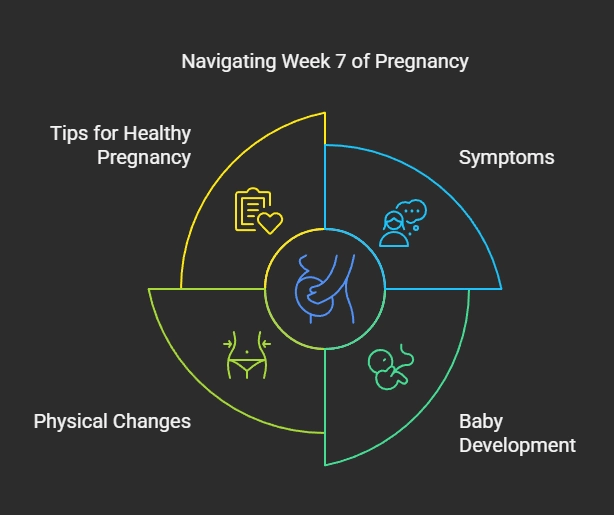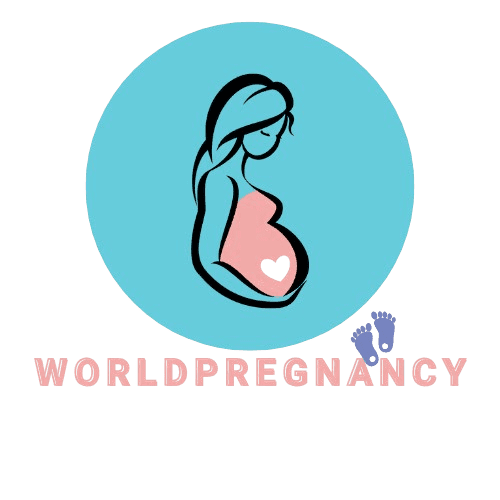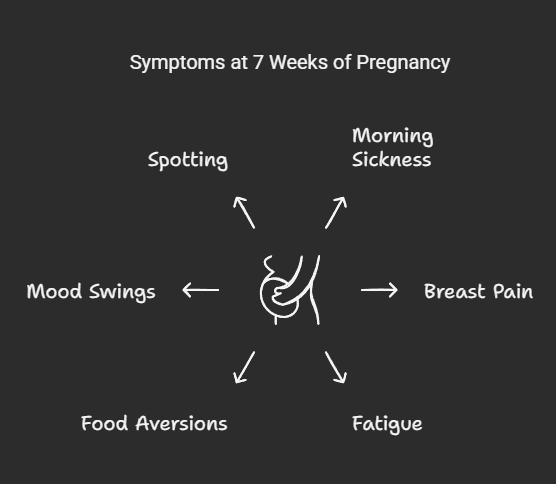Seventh Week of Pregnancy – Symptoms, Baby Development & Tips
Entering the Seventh Week of Pregnancy? Discover key symptoms, baby growth, body changes, and essential tips for a healthy pregnancy. Learn more now!
Introduction
The seventh week of pregnancy marks an exciting and transformative phase for both you and your baby. At this stage, your little one is growing rapidly, and your body is adapting to support this incredible journey. Whether you’re a first-time mom or experienced in pregnancy, understanding what to expect during the seventh week can help you feel more confident and prepared. In this blog, we’ll explore the symptoms, baby development, physical changes, and essential tips to ensure a healthy and happy pregnancy.

During the seventh week, your body undergoes significant changes as it adjusts to the growing life inside you. Here are some common symptoms you might experience:
Morning Sickness:
Nausea and vomiting, often referred to as morning sickness, are hallmark symptoms of early pregnancy. Despite its name, it can occur at any time of the day.Breast Pain or Swelling:
Hormonal changes can cause your breasts to feel tender, sore, or swollen. This is your body preparing for breastfeeding.Fatigue:
Feeling unusually tired? Your body is working hard to support your baby’s growth, so rest is essential.Food Aversions and Cravings:
You might find yourself repelled by certain foods or craving others. This is completely normal and linked to hormonal shifts.Mood Swings:
Fluctuating hormones can lead to emotional ups and downs. Be kind to yourself and seek support when needed.Spotting:
Light spotting can occur, but if it’s heavy or accompanied by pain, consult your doctor immediately.
Baby Development at 7 Weeks
Your baby is now about the size of a blueberry or grape, measuring approximately 10mm in length (crown-rump length). Here’s what’s happening in your little one’s world:
Rapid Brain Development:
The brain is growing at an astonishing rate, forming new neural connections every second.Arm and Leg Buds:
Tiny arm and leg buds are starting to form, laying the foundation for your baby’s limbs.Facial Features:
Eyes, nose, mouth, and ears are beginning to take shape, making your baby look more human-like.Umbilical Cord Formation:
The umbilical cord is now fully formed, providing your baby with essential nutrients and oxygen.Heartbeat:
Your baby’s heart is beating at a steady rhythm, and it may even be visible on an ultrasound.
Physical Changes in Your Body
Your body is working overtime to support your growing baby. Here’s what you might notice:
Stomach Size:
While you may not yet have a visible baby bump, you might feel bloated or notice slight changes in your abdomen.Hormonal Changes:
Hormones like progesterone and estrogen are surging, contributing to symptoms like fatigue and mood swings.Gas and Bloating:
Hormonal shifts can slow down digestion, leading to gas and bloating.
Taking care of yourself is the best way to ensure a healthy pregnancy. Here are some tips:
Nutrition:
Focus on a balanced diet rich in fruits, vegetables, whole grains, and lean proteins. Don’t forget your prenatal vitamins!Hydration:
Drink plenty of water to stay hydrated and support your body’s increased blood volume.Exercise:
Gentle exercises like walking or prenatal yoga can boost your energy and improve circulation.Rest:
Listen to your body and get plenty of sleep. Your body is working hard, and rest is crucial.Avoid Harmful Substances:
Stay away from alcohol, smoking, and caffeine. Consult your doctor before taking any medications.
Q1: Can I feel my baby at 7 weeks?
A: No, you cannot feel your baby at 7 weeks pregnant. At this early stage, your baby is still very small—about the size of a blueberry or grape (around 10mm long). The baby’s movements are not yet strong enough to be felt by the mother. Most women begin to feel their baby’s movements, often described as “flutters” or “quickening,” between 16 and 25 weeks of pregnancy, though this can vary depending on factors like the position of the placenta and whether it’s your first pregnancy.
Q2: Is spotting normal at 7 weeks?
A: Light spotting can be normal at 7 weeks due to hormonal changes, cervical sensitivity, or implantation. However, if the bleeding is heavy, persistent, or accompanied by pain, contact your healthcare provider immediately to rule out complications like miscarriage or ectopic pregnancy. Always consult your doctor for reassurance. .
Q3: What should I avoid at 7 weeks pregnant?
A:
At 7 weeks pregnant, your baby is undergoing critical development, so it’s important to avoid certain things to ensure a healthy pregnancy. Here’s a quick guide:
Alcohol and Smoking:
Both can harm your baby’s development and increase the risk of complications.Raw or Undercooked Foods:
Avoid raw meat, fish, eggs, and unpasteurized dairy to prevent foodborne illnesses like listeria or salmonella.High-Mercury Fish:
Steer clear of shark, swordfish, king mackerel, and tilefish. Opt for low-mercury options like salmon or shrimp.Excessive Caffeine:
Limit caffeine to 200mg per day (about one 12-ounce cup of coffee) to reduce the risk of miscarriage.Certain Medications:
Always consult your doctor before taking any medications, including over-the-counter drugs or supplements.Hot Tubs and Saunas:
High temperatures can be harmful to your baby, so avoid prolonged exposure to heat.Strenuous Exercise:
Stick to gentle activities like walking or prenatal yoga, and avoid heavy lifting or high-impact workouts.Stress:
Practice relaxation techniques like deep breathing or meditation to keep stress levels in check.
Q4: How can I manage morning sickness?
A: Eat Small, Frequent Meals: Avoid an empty stomach by eating small, bland snacks like crackers or toast throughout the day.
Stay Hydrated: Sip water, ginger tea, or electrolyte drinks to prevent dehydration.
Try Ginger: Ginger tea, candies, or supplements can help ease nausea.
Avoid Triggers: Steer clear of strong smells or foods that worsen nausea.
Rest: Fatigue can worsen nausea, so prioritize sleep and rest.
Vitamin B6: Ask your doctor about taking vitamin B6, which may reduce nausea.
Acupressure Bands: Wristbands designed for motion sickness can help.
Q5: When should I have my first ultrasound?
A: Your first ultrasound is typically scheduled between 8 and 12 weeks of pregnancy. This is often called the dating scan or viability scan, and it helps confirm your due date, check the baby’s heartbeat, and ensure everything is progressing as expected. However, if you have any complications or concerns, your doctor may recommend an earlier ultrasound. Always follow your healthcare provider’s advice for the best timing!
Conclusion
The seventh week of pregnancy is a time of rapid growth and change for both you and your baby. By understanding the symptoms, baby development, and necessary precautions, you can navigate this phase with confidence. Remember, every pregnancy is unique, so always consult your healthcare provider for personalized advice.
Take care of yourself, stay informed, and enjoy this incredible journey into motherhood!

